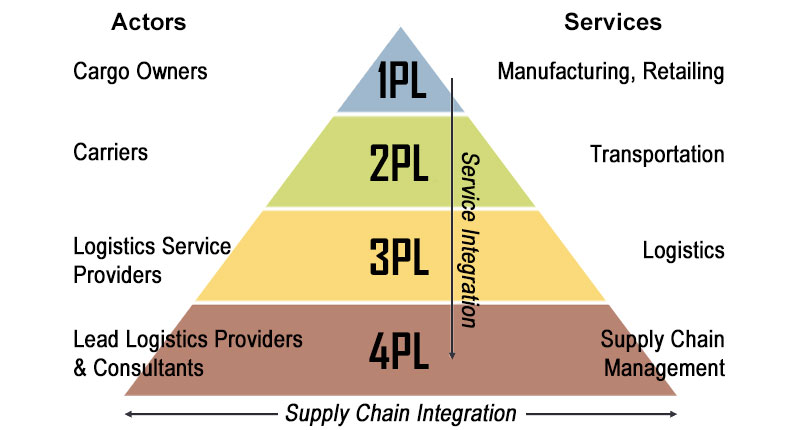Third Party Logistics- Role in Supply Chain
Third Party Logistics Definition
Third Party Logistics (3PL) services have become an integral part of supply chain. The growth of 3 PL provides opportunities for starting a venture with minimum risks as they have captive customers.
“A person who solely receives, holds, or otherwise transports a consumer product in the ordinary course of business but who does not take title to the product.” ( 2008 US legislation)

http://i1.wp.com/cerasis.com/wp-content/uploads/2013/08/third-party-logistics-outsourcing.jpg
What is Third Party Logistics (3PL)
Outsourcing all or much of a company’s logistics operations to a specialized company.
The term "3PL" was first used in the early 1970s to identify intermodal marketing companies (IMCs) in transportation contracts. Up to that point, contracts for transportation had featured only two parties, the shipper and the carrier. When IMCs entered the picture—as intermediaries that accepted shipments from the shippers and tendered them to the rail carriers—they became the third party to the contract, the 3PL. Preferably, these services are integrated, or “bundled,” together by the provider.
Services they provide are transportation, warehousing, cross-docking, inventory management, packaging, and freight forwarding. ( Source: Council of Supply Chain management Professionals)
Third party Logistics- Evolution

Image Courtesy:http://www.supplychain247.com/article/3pl_vs_4pl_what_are_these_pls_anyway_the_layers_of_logistics_explained
Why 3 PL
• Pressure from shareholders to increase shareholder value
• Pressure from customers to improve service at lower costs
• Reduce capital investments in non-revenue producing assets
• Emergence of professional 3P logistics service providers
3P logistics is a readily accepted means of increasing performance of non-core supply chain activities.
Outsourcing allows organizations to focus on their
• Core competencies
• To provide a differentiated level of customer service
• To take advantage of greater operational flexibility
Services Provided by 3 PL

• Collection of Materials
• Storage of Materials
• Picking & Packing of Materials
• Processing of Materials
• Cross docking
• Invoicing
• Collection & deposit of Cheques
• Managing Information flow & Networks
• Value added services like Bar Coding, Scanning, Packing of warranty cards, promotional material packaging.
• Customs clearance formalities
• Excise & Sales Documentation
• Transportation of goods
• Claims settlement & legal formalities
Emergence of 4 PL
The 4PL acts as a single point of interface with the
client organization and provides the management of multiple service providers
through a teaming partnership or an alliance.
The Fourth Party Logistics provider is a supply chain integrator that assembles and manages the resources, capabilities, and technology of its own organization with those of complementary service providers to deliver a comprehensive supply chain solution.
To be successful, a 4PL leverages a full range of service providers (3PLs, IT providers, contract logistics providers, call centers, etc.) along with the capabilities of the client and its supply chain partners
4 PL can be termed as a strategic partner further adding value to the supply chain.
Opportunities
The emergence of e- commerce, integration of global markets provides huge opportunities for the growth of 3 PL. The advantage for a startup 3PL entrepreneur is i) Not highly Capital Intensive ii) Lower Risk factor
A Successful Collaborative Model
In India Reliance funded 3 PL providers for their HDPE/ LDPE business. Reliance participation gives confidence to 3 PL as the investment brings in strategic inputs from the big brother.

